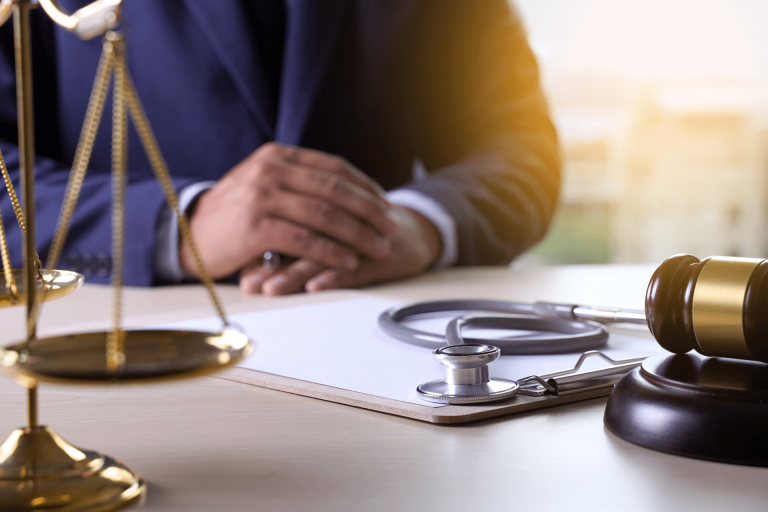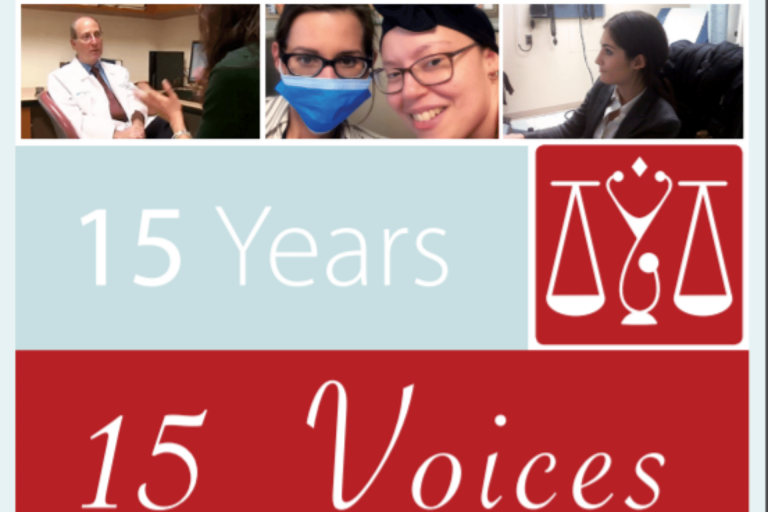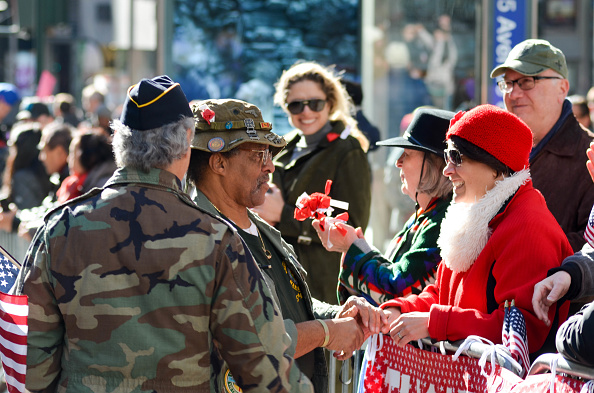By Dan Gorenstein
WHYY
“I hope to extend my life as long as possible for the sake of my children.”
This is a story about family.
“I was told I only had four to six months to live.”
This is a story about what happens when you have no good option.
“I wanted to try anything, maybe a miracle could happen.”
That’s J., a 41-year old mother who emigrated from China 18 years ago.
Her family lives in Queens, New York. All three kids are United States citizens. We’re not identifying the family and instead using an initial for J. because she and her husband are in danger of deportation.
In the spring of 2016, J. was diagnosed with terminal stomach cancer. Then, last fall she had a choice — the opportunity to enter a drug trial.
“You look at these clinical trials. There are some patients who just forget to die,” said Steve Lee, J.’s oncologist. Lee works at Bellevue Hospital in Manhattan.
Lee said the clinical trial would give J. access to a potent medicine that researchers want to test on her form of cancer.
“She could be one of these long-term survivors,” he said.
But there was a problem. The only way J. could get into the drug trial was if she got insurance, specifically Medicaid. To qualify, she’d have to do one of the last things an undocumented immigrant would want to do — declare herself to the U.S. Department of Homeland Security. It meant stepping out of the shadows, providing her address and the names of everyone she lived with.
“Before getting sick, legal status was clearly important,” J. said. “Now, both legal immigration status and my ability to continue to live are intertwined because I can only get good treatment if I obtain legal status.”
J. had this option because she lives in New York state. Much of her care had come through something known as emergency Medicaid, that’s a way for people who can’t qualify for traditional Medicaid to get coverage for a serious illness. New York happens to have one of the most generous programs in the country.
Steven Wallace, a health professor at University of California, Los Angeles, says each state defines “emergency” differently.
“In some states, they say giving you dialysis is keeping you from dying. We are going to put you on emergency Medicaid,” he said. “In other states — Georgia comes to mind — they will not put you on emergency Medicaid until you are in diabetic shock.”
By the time J. learned about the drug trial, she’d had chemotherapy. She’d had part of her stomach removed. After the cancer spread into her ovaries, those were taken out.
For context, some estimates suggest that stomach cancer treatment for one year costs well over $100,000. Costs vary from hospital to hospital, and Medicaid negotiates hefty discounts. Plus, many medical centers offer charity by forgiving medical expenses for low-income patients.
We don’t have the tally on J.’s medical bills, but she received world-class health care.
“I hope to extend my life as long as possible for the sake of my children.”
This is a story about family.
“I was told I only had four to six months to live.”
This is a story about what happens when you have no good option.
“I wanted to try anything, maybe a miracle could happen.”
That’s J., a 41-year old mother who emigrated from China 18 years ago.
Her family lives in Queens, New York. All three kids are United States citizens. We’re not identifying the family and instead using an initial for J. because she and her husband are in danger of deportation.
In the spring of 2016, J. was diagnosed with terminal stomach cancer. Then, last fall she had a choice — the opportunity to enter a drug trial.
“You look at these clinical trials. There are some patients who just forget to die,” said Steve Lee, J.’s oncologist. Lee works at Bellevue Hospital in Manhattan.
Lee said the clinical trial would give J. access to a potent medicine that researchers want to test on her form of cancer.
“She could be one of these long-term survivors,” he said.
But there was a problem. The only way J. could get into the drug trial was if she got insurance, specifically Medicaid. To qualify, she’d have to do one of the last things an undocumented immigrant would want to do — declare herself to the U.S. Department of Homeland Security. It meant stepping out of the shadows, providing her address and the names of everyone she lived with.
“Before getting sick, legal status was clearly important,” J. said. “Now, both legal immigration status and my ability to continue to live are intertwined because I can only get good treatment if I obtain legal status.”
J. had this option because she lives in New York state. Much of her care had come through something known as emergency Medicaid, that’s a way for people who can’t qualify for traditional Medicaid to get coverage for a serious illness. New York happens to have one of the most generous programs in the country.
Steven Wallace, a health professor at University of California, Los Angeles, says each state defines “emergency” differently.
“In some states, they say giving you dialysis is keeping you from dying. We are going to put you on emergency Medicaid,” he said. “In other states — Georgia comes to mind — they will not put you on emergency Medicaid until you are in diabetic shock.”
By the time J. learned about the drug trial, she’d had chemotherapy. She’d had part of her stomach removed. After the cancer spread into her ovaries, those were taken out.
For context, some estimates suggest that stomach cancer treatment for one year costs well over $100,000. Costs vary from hospital to hospital, and Medicaid negotiates hefty discounts. Plus, many medical centers offer charity by forgiving medical expenses for low-income patients.
We don’t have the tally on J.’s medical bills, but she received world-class health care.

More often than not, when a life-threatening illness like stomach cancer happens, undocumented women and men miss out on the tests, procedures and drugs that can extend their lives.
The little research there is on care for very sick undocumented immigrants shows that the treatment is so uneven — sometimes it’s different, county to county, within a state.
By contrast, because she lives in New York, J. received a lot of expensive medical care through emergency Medicaid. But the program doesn’t pay for drug trials. For that, J. need traditional Medicaid. And for that, she’d need to appeal to the Trump administration.
J. had hit a wall.
She needed to decide if getting that cancer medicine, the one thing that might extend her life, was important enough that she’d be willing to be deported or see her husband deported — to maybe break up her family.
I asked J. if she was more afraid to die than be deported.
J.’s English-language skills are limited. For most of our conversation, she spoke through a translator. But to answer that question, she spoke directly to me in English.
“Yeah, I [am] afraid to die, more than be deported,” she said. “Of course. Because my family need[s] me. My children need me.”
This is where attorney Domna Antoniadis comes in.
Antoniadis, a senior staff attorney at the New York Legal Assistance Group, works just across the hall from J.’s doctor at Bellevue Hospital. Her job: Help patients jump through the bureaucratic hoops to get health coverage. She said J. had a compelling case.
“She’s been here for almost 20 years. She has three young U.S. citizen children. She’s never been arrested; no criminal history. She’s worked. And right now, she has a very aggressive form of cancer,” she said.
J. and her family faced this dilemma as the threat of deportation has grown under President Trump.
Federal figures show arrests of undocumented people living in the U.S. are up 40 percent over the previous 12-month period. Declaring herself to the government was a real risk.
“She’s saying, ‘Here I am,’” Antoniadis said. “This is what’s going on with me, but please don’t remove me.”
J. went home to talk with her husband. He’d seen his wife do everything she could: change her diet, walk up hills for exercise, follow doctor’s orders. Now it was the drug trial. The decision was clear, he said.
“Life is more important than anything else. You have to face the cancer,” he said, speaking through a translator. “You have to face the pressures. You just have to do whatever it takes so that you can keep on living.”
J. submitted the application, and Antoniadis advised the family to be cautious. She told them if federal agents show up at the house, before opening the door, the family should make sure the officials have a warrant. Her attorney gave J. a guide outlining her rights in Mandarin.
“I want to see your sister grow up and get married.”
—J.
Over the fall, J.’s husband said the family felt vulnerable.
“We watch the news,” he said. “We see the things Donald Trump says, and we see that he’s been tough on immigration and has tried to make a lot of changes. So, for sure, we’re more worried.”
A new fear settled over the family, the kind of balled-up-tight fear that knots your stomach. Life at home shifted. Their 13-year-old daughter did dinner dishes. Their 12-year-old son set the table and played fewer video games, trying to make his mom happy. Their kid sister, just 4 years old, asked why everything was different.
J. talked less.
There was one other thing the kids could do; help bolster their mother’s application with Homeland Security.
“Dear the most highly respected judge and court, I’m writing this because I love my mom.” That’s the beginning of the letter J.’s oldest daughter wrote to D.H.S. officials. “My mom is very important to me. I have no idea what to do without her. Even though my mom’s afraid, she’s not giving up. I remember once she said to me: ‘I’m going to try to live as long as I can. I want to see your sister grow up and get married. Then I’ll be content. I don’t want to die before that.’”
While waiting to hear from Homeland Security, J. got word from New York’s regular Medicaid program that she had been approved. J. had her first drug trial treatment in December. She tried to savor what she had.
“Now I’m not nearly as strict with my kids. I sort of just let them be kids. Before, I’d give them extra homework on top of what’s assigned at school. Now, I just want them to be happy,” she said. “Between my husband and me, we care a lot less about money. Before, we only go out to dinner once a month. Now we treasure every moment we have.”
Almost as soon as J. was in the drug trial, she was out. Oncologist Steve Lee said J. “had rapid growth of her cancer” and couldn’t remain in the trial. By early January, J. had started hospice. Now, the care she gets is to make her as comfortable as possible. J.’s lawyer says it’s unlikely she’ll live long enough to get deported. But the new, heightened risk for her husband won’t go away. And he’ll likely be on his own to figure out what that means for him and their kids.
I asked Lee if he thought the trial was worth the all the risk and stress it caused the family.
“I think it’s easier to say that going on the drug trial was a waste of time in retrospect,” he said. “But the alternative for cancer like this is that she would invariably die. So I think that the opportunity to give her a shot at long-term survival was one worth putting a lot on the line for.”
Lee said what the trial really gave J., and her family, was hope.
Living in the United States, that is something few undocumented immigrants as sick as J. ever get.
She had a chance at survival.
More often than not, when a life-threatening illness like stomach cancer happens, undocumented women and men miss out on the tests, procedures and drugs that can extend their lives.
The little research there is on care for very sick undocumented immigrants shows that the treatment is so uneven — sometimes it’s different, county to county, within a state.
By contrast, because she lives in New York, J. received a lot of expensive medical care through emergency Medicaid. But the program doesn’t pay for drug trials. For that, J. need traditional Medicaid. And for that, she’d need to appeal to the Trump administration.
J. had hit a wall.
She needed to decide if getting that cancer medicine, the one thing that might extend her life, was important enough that she’d be willing to be deported or see her husband deported — to maybe break up her family.
I asked J. if she was more afraid to die than be deported.
J.’s English-language skills are limited. For most of our conversation, she spoke through a translator. But to answer that question, she spoke directly to me in English.
“Yeah, I [am] afraid to die, more than be deported,” she said. “Of course. Because my family need[s] me. My children need me.”
This is where attorney Domna Antoniadis comes in.
Antoniadis, a senior staff attorney at the New York Legal Assistance Group, works just across the hall from J.’s doctor at Bellevue Hospital. Her job: Help patients jump through the bureaucratic hoops to get health coverage. She said J. had a compelling case.
“She’s been here for almost 20 years. She has three young U.S. citizen children. She’s never been arrested; no criminal history. She’s worked. And right now, she has a very aggressive form of cancer,” she said.
J. and her family faced this dilemma as the threat of deportation has grown under President Trump.
Federal figures show arrests of undocumented people living in the U.S. are up 40 percent over the previous 12-month period. Declaring herself to the government was a real risk.
“She’s saying, ‘Here I am,’” Antoniadis said. “This is what’s going on with me, but please don’t remove me.”
J. went home to talk with her husband. He’d seen his wife do everything she could: change her diet, walk up hills for exercise, follow doctor’s orders. Now it was the drug trial. The decision was clear, he said.
“Life is more important than anything else. You have to face the cancer,” he said, speaking through a translator. “You have to face the pressures. You just have to do whatever it takes so that you can keep on living.”
J. submitted the application, and Antoniadis advised the family to be cautious. She told them if federal agents show up at the house, before opening the door, the family should make sure the officials have a warrant. Her attorney gave J. a guide outlining her rights in Mandarin.
“I want to see your sister grow up and get married.”
—J.
“We watch the news,” he said. “We see the things Donald Trump says, and we see that he’s been tough on immigration and has tried to make a lot of changes. So, for sure, we’re more worried.”
A new fear settled over the family, the kind of balled-up-tight fear that knots your stomach. Life at home shifted. Their 13-year-old daughter did dinner dishes. Their 12-year-old son set the table and played fewer video games, trying to make his mom happy. Their kid sister, just 4 years old, asked why everything was different.
J. talked less.
There was one other thing the kids could do; help bolster their mother’s application with Homeland Security.
“Dear the most highly respected judge and court, I’m writing this because I love my mom.” That’s the beginning of the letter J.’s oldest daughter wrote to D.H.S. officials. “My mom is very important to me. I have no idea what to do without her. Even though my mom’s afraid, she’s not giving up. I remember once she said to me: ‘I’m going to try to live as long as I can. I want to see your sister grow up and get married. Then I’ll be content. I don’t want to die before that.’”
While waiting to hear from Homeland Security, J. got word from New York’s regular Medicaid program that she had been approved. J. had her first drug trial treatment in December. She tried to savor what she had.
“Now I’m not nearly as strict with my kids. I sort of just let them be kids. Before, I’d give them extra homework on top of what’s assigned at school. Now, I just want them to be happy,” she said. “Between my husband and me, we care a lot less about money. Before, we only go out to dinner once a month. Now we treasure every moment we have.”
Almost as soon as J. was in the drug trial, she was out. Oncologist Steve Lee said J. “had rapid growth of her cancer” and couldn’t remain in the trial. By early January, J. had started hospice. Now, the care she gets is to make her as comfortable as possible. J.’s lawyer says it’s unlikely she’ll live long enough to get deported. But the new, heightened risk for her husband won’t go away. And he’ll likely be on his own to figure out what that means for him and their kids.
I asked Lee if he thought the trial was worth the all the risk and stress it caused the family.
“I think it’s easier to say that going on the drug trial was a waste of time in retrospect,” he said. “But the alternative for cancer like this is that she would invariably die. So I think that the opportunity to give her a shot at long-term survival was one worth putting a lot on the line for.”
Lee said what the trial really gave J., and her family, was hope.
Living in the United States, that is something few undocumented immigrants as sick as J. ever get.
She had a chance at survival.
Originally published in WHYY on February 1, 2018.








